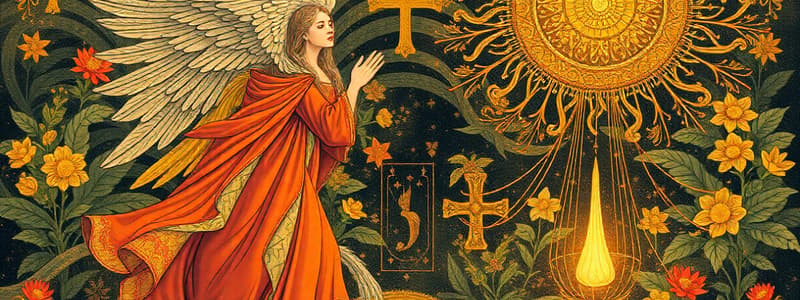Podcast
Questions and Answers
Which of the following BEST describes a 'Belief System' in the context of business?
Which of the following BEST describes a 'Belief System' in the context of business?
- A structured set of principles shaping perspectives, behaviors, and decision-making. (correct)
- A marketing strategy used to target specific religious demographics.
- A legal requirement for businesses operating in multicultural environments.
- A random collection of personal opinions held by employees.
A belief is an acceptance that something exists or is true with concrete evidence.
A belief is an acceptance that something exists or is true with concrete evidence.
False (B)
Name TWO major belief systems that can influence business practices, as mentioned in the provided text.
Name TWO major belief systems that can influence business practices, as mentioned in the provided text.
Christianity, Islam, Buddhism, Hinduism, or Judaism (any two)
The Christian faith centers on the life, teachings, death, and resurrection of ______.
The Christian faith centers on the life, teachings, death, and resurrection of ______.
Match the following belief systems with their core element or foundational text:
Match the following belief systems with their core element or foundational text:
Which concept is a core belief in Christianity?
Which concept is a core belief in Christianity?
Islam is a polytheistic religion.
Islam is a polytheistic religion.
What are the two main sects of Islam?
What are the two main sects of Islam?
Buddhism is based on the ______, which outline the nature of suffering and the path to its cessation.
Buddhism is based on the ______, which outline the nature of suffering and the path to its cessation.
Match the following concepts to their respective belief system:
Match the following concepts to their respective belief system:
Which of the following is characteristic of Hinduism?
Which of the following is characteristic of Hinduism?
Judaism is based on the belief in multiple gods.
Judaism is based on the belief in multiple gods.
Name TWO key aspects of Jewish faith and practice.
Name TWO key aspects of Jewish faith and practice.
In Islam, ______ is the declaration that 'There is no god but Allah, and Muhammad is His Messenger.'
In Islam, ______ is the declaration that 'There is no god but Allah, and Muhammad is His Messenger.'
Match the philosophical concept with the religion:
Match the philosophical concept with the religion:
Which Filipino value encourages spontaneity and adaptability in decision-making?
Which Filipino value encourages spontaneity and adaptability in decision-making?
'Ningas-Cogon' refers to sustained enthusiasm and commitment to projects until completion.
'Ningas-Cogon' refers to sustained enthusiasm and commitment to projects until completion.
What is 'Utang na Loob' in the context of Filipino values?
What is 'Utang na Loob' in the context of Filipino values?
The Filipino value of '______' is characterized by a deep sense of self-worth and pride in one's achievements and can lead to high standards of work.
The Filipino value of '______' is characterized by a deep sense of self-worth and pride in one's achievements and can lead to high standards of work.
Match the Filipino value with its description:
Match the Filipino value with its description:
Flashcards
What is a Belief?
What is a Belief?
An acceptance that something exists or is true, especially without proof, influencing decisions.
What is a Belief System?
What is a Belief System?
A structured set of principles shaping perspectives, behaviors, and decision-making processes.
Christianity
Christianity
Monotheistic religion centered on Jesus Christ's life, teachings, and resurrection.
Islam
Islam
Signup and view all the flashcards
Buddhism
Buddhism
Signup and view all the flashcards
Hinduism
Hinduism
Signup and view all the flashcards
Judaism
Judaism
Signup and view all the flashcards
Corporate Social Responsibility (CSR)
Corporate Social Responsibility (CSR)
Signup and view all the flashcards
Bahala Na
Bahala Na
Signup and view all the flashcards
Utang na Loob
Utang na Loob
Signup and view all the flashcards
Ningas-Cogon
Ningas-Cogon
Signup and view all the flashcards
Padrino System
Padrino System
Signup and view all the flashcards
Amor Propio
Amor Propio
Signup and view all the flashcards
Mañana Habit
Mañana Habit
Signup and view all the flashcards
Delicadeza
Delicadeza
Signup and view all the flashcards
Hiya
Hiya
Signup and view all the flashcards
Pakikisama
Pakikisama
Signup and view all the flashcards
Study Notes
Beliefs
- Acceptance that something exists or is true, without proof.
Belief Systems
- A structured set of principles that shape perspectives, influencing corporate ethics, leadership styles, workplace culture, and consumer behaviors.
- Understanding this concept is crucial for those in multicultural environments, as it impacts decision-making, marketing, HR, and customer relations.
- Belief systems manifest in business through religious doctrines, philosophical viewpoints, and cultural traditions.
Christianity
- One of the world's largest and most influential religions with over 2.3 billion adherents worldwide.
- It is a monotheistic faith centered on the life, teachings, death, and resurrection of Jesus Christ.
- Based on the Bible, containing the Old and New Testaments, it includes the belief in the Trinity, salvation through Jesus, and the promise of eternal life.
- Historically, it has shaped culture, ethics, and social values, influencing art, philosophy, law, and governance.
- It emphasizes love, compassion, forgiveness, and service, adapting to different cultural contexts while maintaining its core teachings.
Islam
- A monotheistic religion originating in the 7th century CE in the Arabian Peninsula with over 1.9 billion followers, known as Muslims.
- Based on the teachings of the Prophet Muhammad, it considers him the final messenger of God (Allah).
- The foundational texts are the Qur'an and the Hadith, summarizing core beliefs in the Five Pillars:
- Shahada (Faith)= "There is no god but Allah, and Muhammad is His Messenger."
- Salat (Prayer) = performing five daily prayers facing Mecca.
- Zakat (Charity) = giving a portion of wealth to the needy
- Sawm (Fasting)= observing fasting during Ramadan
- Hajj (Pilgrimage)= pilgrimage to Mecca once in a lifetime if able.
- There are two main sects: Sunni (majority) and Shia (minority)
- In emphasizes submission to God, justice, compassion, and ethical living.
Buddhism
- A spiritual tradition and philosophy founded in India in the 5th-4th century BCE.
- Follows a non-theistic religion focused on enlightenment (nirvana) through wisdom, ethical conduct, and mental discipline.
- Central belief in the Four Noble Truths:
- Dukkha = suffering as inherent
- Samudaya = the cause of suffering is craving
- Nirodha = suffering can end by eliminating desire
- Magga = path to ending suffering is the Eightfold Path with thought, speech, action, livelihood, effort, mindfulness, and concentration.
- Divided into Theravāda, Mahayana, and Vajrayana.
Hinduism
- The world's oldest known religion, with origins dating back over 4,000 years in the Indian subcontinent.
- Does not have a founder, but is a complex system of beliefs, practices, and traditions evolved over millennia.
- Has over 1.2 billion followers.
- Unified by core beliefs:
- Dharma = the ethical and moral duties
- Karma = the law of cause and effect
- Samsara = the cycle of birth, death, and rebirth (reincarnation)
- Moksha = liberation from the cycle of rebirth
- Hindu worships various deities including Brahma, Vishnu, Shiva, Lakshmi, Saraswati, and Durga but teaches that all gods are manifestations of Brahman.
- Key Hindu texts include the Vedas, Upanishads, Bhagavad Gita, Ramayana and Mahabharata.
Judaism
- It is one of the oldest monotheistic religions with origins to the covenant between God and Abraham.
- There are approximately 15 million Jews globally.
- It is the foundation of both Christianity and Islam.
- Key is the Tanakh, the Torah and the Talmud.
- Centered on the belief in one God (Yahweh), it adheres to religious laws and traditions:
- Observance of commandments (Mitzvot) with ethical and religious duties
- Sabbath (Shabbat) a weekly day of rest and worship
- Religious festivals such as Passover, Yom Kippur, Hanukkah, and Rosh Hashanah.
- Encourages social justice and good deeds by the concept of Tikkun Olam.
- Several denominations include Orthodox, Conservative, Reform, and Reconstructionist Judaism
- Throughout history has shaped ethics, philosophy, law, and literature while Jewish communities have played a significant role in science, business, politics, and culture worldwide.
Impact of Belief Systems on Business
- Religions often emphasize honesty, integrity, fairness, and accountability.
- Many emphasize servant leadership, humility, and accountability in leadership styles.
- Corporate social responsibility emphasizes charity, social justice, and ethical responsibility.
- Religious beliefs can influence finance management, investments, and economic policies, and may prohibit exploitative financial practices.
- It encourage fair treatment of employees, policies, and work-life balance
- Christianity promotes ethical dealings through honesty, fairness, and respect, prioritizing transparency, while discouraging hoarding or exploitation.
- Islam emphasizes justice and fairness and discourages fraud or unethical practices.
- Buddhism advocates ethical commerce through the principle of Right Livelihood, with mindfulness, compassion, and sustainability.
- Hinduism supports ethical commerce based on Dharma, with Karma Yoga promoting ethical business decisions while following Seva.
- Judaism stresses fairness and honesty in business by charitable giving, ethical responsibility, and community service while valuing Tzedakah.
Filipino Value System
- It is deeply rooted in cultural heritage and influences business practices, decision-making, work ethics, and management styles.
- Bahala Na, a belief in fate or destiny, leads to spontaneity and unplanned decisions.
- Utang na Loob is the sense of gratitude that strengthens partnerships while sometimes leads to favoritism.
- Ningas-Cogon, is the tendency to start projects which may affect long-term sustainability and business plans.
- Padrino System uses relationships for business through connections and opportunities.
- Amor Propio (Self-Respect or Love or Pride) makes receiving constructive criticism difficult, in order to maintain reputiations.
- Mañana Habit results in rushed work and missed deadlines.
- Delicadeza in a moral code of ethics protects corruption and unethical behavior while promoting honesty.
- Hiya can prevent assertiveness in negotiations by professional behaviors.
- Pakikisama/ Pakikipagkapwa-Tao has teamwork
- Family Orientation prioritizes family interests, with family members working together in businesses.
- The Suki System encourages repeat business and fosters long-term relationships.
- Bayanihan teamwork emphasizes collective problem-solving
- Palabra de Honor builds credibility in business relationships.
- Lakas ng Loob helps entrepreneurs take calculated risks.
- Pakikipagsapalaran can also lead to economic growth by exploration.
- Frugality helps save resources, and is cost efficient
- Filial Piety allows businesses to maintain hierarchy
- Resilience encourage perseverance.
Studying That Suits You
Use AI to generate personalized quizzes and flashcards to suit your learning preferences.




